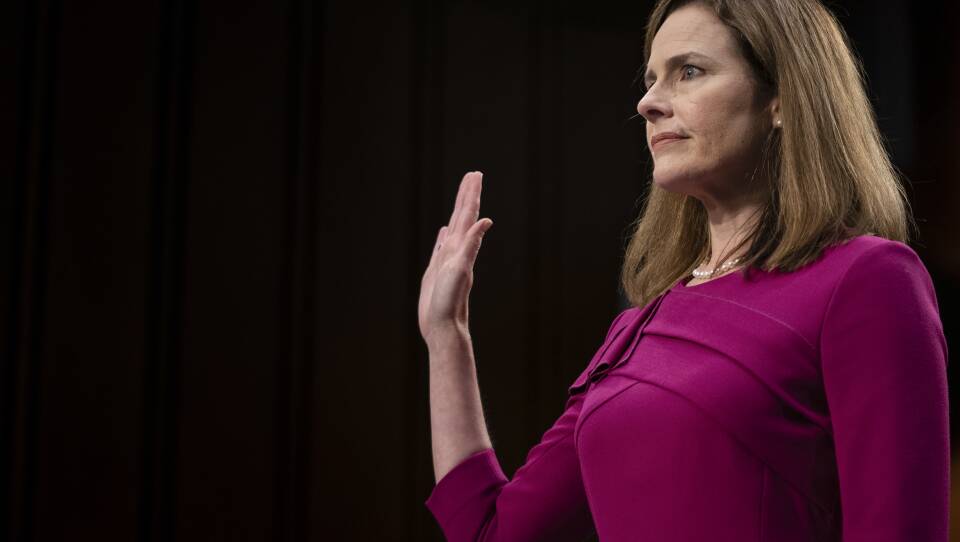Confirmation hearings for Judge Amy Coney Barrett are underway on Capitol Hill. GBH Morning Edition host Joe Mathieu spoke with Northeastern University law professor and GBH News legal analyst Daniel Medwed about the short term and long term implications of Barrett's potential appointment to the U.S. Supreme Court. The transcript below has been edited for clarity.
Joe Mathieu: Big stuff going on here. I'm just curious, first of all, any reactions to yesterday's hearing — day one?
Daniel Medwed: Well, frankly, I find it discouraging on multiple levels. And as you know, I'm not someone who's prone to being discouraged. First, the fact that the Republicans have done such an about face from their position in 2016 and their views on Merrick Garland and how we shouldn't have a nomination process that close to an election strikes me as rather absurd, unseemly and to some extent illegitimate. Second, like so many things, this hearing is being conducted under the cloud of COVID-19, as reflected by the remote appearance of some Judiciary Committee members, like Kamala Harris, and the in-person appearance of others, like Lindsey Graham, who maybe should be remote given possible exposure to COVID-19. There's also this feeling of inevitability that's hanging over the proceedings because unlike the confirmation hearings for Brett Kavanaugh two years ago, it appears as though the Republicans have locked in the requisite votes. So the real question is not if she'll be confirmed, but really when will she ascend to the bench?
Mathieu: All right, so let's move with that. Let's assume that that Coney Barrett's confirmed, Daniel. A lot of people talked about how she clerked for Justice Scalia [and] how he served as a mentor, a judicial role model to her. Do you anticipate that she would actually follow his approach?
Medwed: Well, I'm not so sure. I think legal observers like to talk about how Supreme Court nominees are tethered to certain distinguished predecessors, maybe someone they clerked for or whose writings they've emulated. But in my experience, Supreme Court justices tend to chart their own path. Consider Justice Samuel Alito. About 15 years ago when he was up for confirmation, people talked about him as an acolyte of Justice Scalia — a mini Scalia. He even got the disparaging nickname "Scalito." I mean, people really said he was going to be the next incarnation of Scalia. But look what he's done over the past 15 years. He has forged his own identity as perhaps the most adamant, staunchest member of the conservative wing. Far more conservative, I think, than Justice Scalia ever was. And I think Amy Coney Barrett will also chart her own path. Yes, she clerked for Scalia. And yes, she's expressed admiration for his judicial philosophy, his fealty to originalism, to the original intent of the Constitution and to textualism. She echoed this yesterday, the importance of interpreting the law as written. But she hasn't revealed the same tendency for frolics and detours that Justice Scalia exhibited, this libertarian streak that occasionally resulted in victories for criminal defendants. So I think in a few years we'll be talking about her own jurisprudence and maybe only make a passing reference to Justice Scalia.
Mathieu: What about immediate impact here, assuming she's confirmed? Is there anything on this year's docket that would be significantly affected by her inclusion?
Medwed: Yes, and I think a lot of people for good reason are talking about November 10th. That's when an oral argument is scheduled in the latest against the Affordable Care Act. This one's being lodged or being supported by the Trump administration. This is just a week after the election. And by then, there's reason to think that she will be on the bench. Also, there's reason to think that Coney Barrett will be potentially hostile to the ACA. In some of her public writings, she's indicated criticism, especially of Chief Justice Roberts' 2012 opinion upholding a central tenant of the ACA. Of course, we don't know what her specific views are on this lawsuit that's pending, but I think people should realize that the ACA is in jeopardy with her on the bench.
Mathieu: Then there's in the long term, at least, Roe v. Wade, Daniel.
Medwed: Exactly. A lot of people are talking about her very public stance on abortion. And her record does indicate a willingness to whittle away [and] to erode access to abortion. Whether she'll go so far as to overturn Roe versus Wade, that's a somewhat unclear. Like many judges, she's expressed support for the concept of "stare decisis", that case precedent should remain intact. But she's also written that "stare decisis" is not a hard and fast rule [and] that occasionally the justices should revisit key cases. So I think we're going to have to wait and see on that one.





